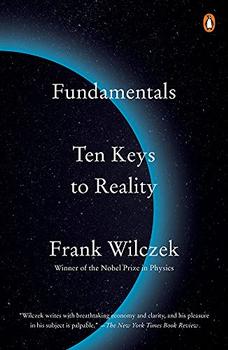Summary | Excerpt | Reviews | Beyond the Book | Readalikes | Genres & Themes | Author Bio

Critics' Opinion:
Readers' Opinion:
First Published:
Jan 2021, 272 pages
Paperback:
Jan 2022, 272 pages
 Book Reviewed by:
Book Reviewed by:
Ian Muehlenhaus
Buy This Book
1
THERE'S PLENTY OF SPACE
PLENTY OUTSIDE AND PLENTY WITHIN
When we say that the something is big—be it the visible universe or a human brain—we have to ask: Compared with what? The natural point of reference is the scope of everyday human life. This is the context of our first world-models, which we construct as children. The scope of the physical world, as revealed by science, is something we discover when we allow ourselves to be born again.
By the standards of everyday life, the world "out there" is truly gigantic. That outer plenty is what we sense intuitively when, on a clear night, we look up at a starry sky. We feel, with no need for careful analysis, that the universe has distances vastly larger than our human bodies, and larger than any distance we are ever likely to travel. Scientific understanding not only supports but greatly expands that sense of vastness.
The world's scale can make people feel overwhelmed. The French mathematician, physicist, and religious philosopher Blaise Pascal (1623–1662) felt that way, and it gnawed at him. He wrote that "the universe grasps me and swallows me up like a speck."
Sentiments like Pascal's—roughly, "I'm very small, I make no difference in the universe"—are a common theme in literature, philosophy, and theology. They appear in many prayers and psalms. Such sentiments are a natural reaction to the human condition of cosmic insignificance, when measured by size.
The good news is that raw size isn't everything. Our inner plenty is subtler, but at least equally profound. We come to see this when we consider things from the other end, bottom up. There's plenty of room at the bottom. In all the ways that really matter, we're abundantly large.
In grade school, we learn that the basic structural units of matter are atoms and molecules. In terms of those units, a human body is huge. The number of atoms in a single human body is roughly 1028−1 followed by 28 zeros: 10,000,000,000,000,000,000,000,000,000.
That is a number far beyond what we can visualize. We can name it—ten octillion—and, after some instruction and practice, we can learn to calculate with it. But it overwhelms ordinary intuition, which is built on everyday experience, when we never have occasion to count that high. Visualizing that many individual dots far exceeds the holding capacity of our brains.
The number of stars visible to unaided human vision, in clear air on a moonless night, is at best a few thousand. Ten octillion, on the other hand, the number of atoms within us, is about a million times the number of stars in the entire visible universe. In that very concrete sense, a universe dwells within us.
Walt Whitman (1819–1892), the big-spirited American poet, felt our inner largeness instinctively. In his "Song of Myself" he wrote, "I am large, I contain multitudes." Whitman's joyful celebration of abundance is just as grounded in objective facts as Pascal's cosmic envy, and it is much more relevant to our actual experience.
The world is large, but we are not small. It is truer to say that there's plenty of space, whether we scale up or down. One shouldn't envy the universe just because it's big. We're big, too. We're big enough, specifically, to contain the outer universe within our minds. Pascal himself took comfort from that insight, as he followed his lament that "the universe grasps me and swallows me up like a speck" with the consolation "but through thought I grasp it."
Excerpted from Fundamentals by Frank Wilczek . Copyright © 2021 by Frank Wilczek . Excerpted by permission of Penguin Press. All rights reserved. No part of this excerpt may be reproduced or reprinted without permission in writing from the publisher.





The House on Biscayne Bay
by Chanel Cleeton
As death stalks a gothic mansion in Miami, the lives of two women intertwine as the past and present collide.

The Flower Sisters
by Michelle Collins Anderson
From the new Fannie Flagg of the Ozarks, a richly-woven story of family, forgiveness, and reinvention.

The Funeral Cryer by Wenyan Lu
Debut novelist Wenyan Lu brings us this witty yet profound story about one woman's midlife reawakening in contemporary rural China.
Your guide toexceptional books
BookBrowse seeks out and recommends the best in contemporary fiction and nonfiction—books that not only engage and entertain but also deepen our understanding of ourselves and the world around us.